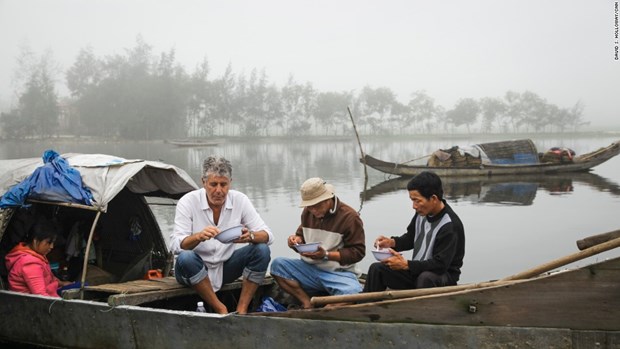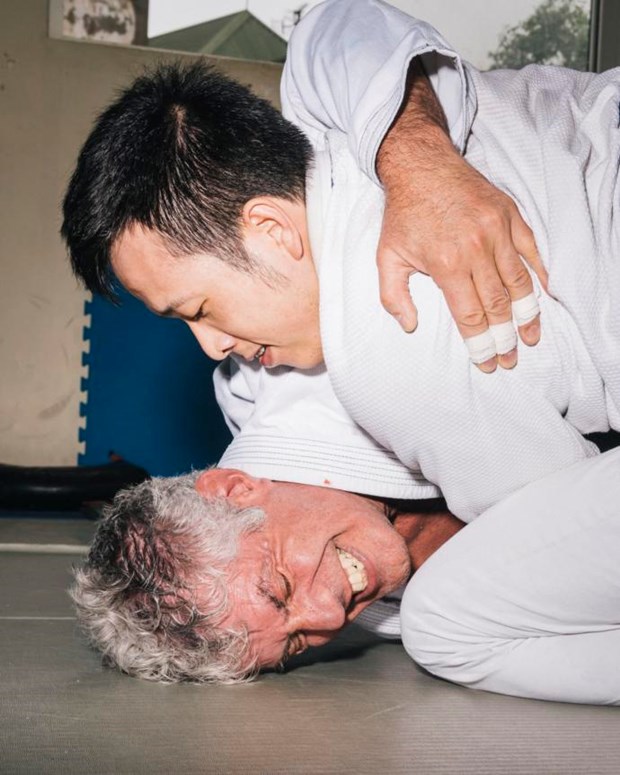Bourdain used the word “pathological” to describe his fixation with being on time. “I judge other people on it,” he admitted. “Today, you’re just late, but eventually you will betray me.”
Kang
Ho Dong Baekjeong is a bright, cacophonous restaurant on Thirty-second Street,
a hipster riff on a Korean steak house. One frigid evening last February, I
arrived, on time, to discover Bourdain waiting for me, already halfway through
a beer. He is more than punctual: he arrives precisely fifteen minutes early to
every appointment. “It comes from his kitchen days,” Tom Vitale, the director,
told me. “If he doesn’t show, we know something’s wrong.” Bourdain used the
word “pathological” to describe his fixation with being on time. “I judge other
people on it,” he admitted. “Today, you’re just late, but eventually you will
betray me.”

Source: Laodongthudo.vn
I
had dined at Baekjeong once before, but I was about to discover that eating at
a restaurant with Bourdain is a markedly different experience. Throughout the
meal, the head chef—Deuki Hong, an amiable, floppy-haired
twenty-seven-year-old—personally presented each dish. One conspicuous hazard of
being Anthony Bourdain is that everywhere he goes, from a Michelin-starred
temple to a peasant hut on the tundra, he is mercilessly inundated with food.
Because he is loath to spurn courtesy of any kind, he often ends up eating much
more than he might like to. Bourdain calls this getting “food fucked.” Now that
he trains nearly every day in jujitsu, he tries to eat and drink more
selectively. “Off camera, I don’t go around getting drunk at night,” he said;
during the meals we shared when he wasn’t shooting, Bourdain didn’t so much
gorge himself as graze. A big bowl of pasta is hard to enjoy if you know it
will render you sluggish the next morning, when a crazy-eyed mixed martial
artist is trying to ease you into a choke hold. Since he started doing jujitsu,
three years ago, Bourdain has lost thirty-five pounds. (He now weighs a hundred
and seventy-five pounds.) But he adores the food at Baekjeong, and was ready to
indulge himself. After Hong arranged silky thin slivers of marinated beef
tongue on a circular grill that was embedded in the table between us, Bourdain
waited until they had just browned, then reached for one with chopsticks and
encouraged me to do the same. We savored the rich, woodsy taste of the meat.
Then Bourdain poured two shots of soju, the Korean rice liquor, and said, “That
is good, huh?”
It
is somewhat ironic that Bourdain has emerged as an ambassador for the culinary
profession, given that, by his own admission, he was never an inspired chef.
Alan Richman, the restaurant critic at GQ, who is a champion of
white-tablecloth haute cuisine, told me that Les Halles “was not a particularly
good restaurant when he was cooking there, and it got worse when he stopped.”
This seemed a little unfair: I frequented Les Halles before it closed, in 2016,
and until the end it was rowdy and reliable, with a good frisée salad and a
sturdy cassoulet. But it was never a standout restaurant. Bourdain used to
genuflect like a fanboy before innovative chefs such as Éric Ripert, of Le
Bernardin. On page 5 of “Kitchen Confidential,” he joked that Ripert, whom he
had never met, “won’t be calling me for ideas on today’s fish special.” After
the book came out, Bourdain was in the kitchen at Les Halles one day, when he
got a phone call. It was Ripert, inviting him to lunch. Today, they are best
friends, and Ripert often plays the straight man to Bourdain on “Parts
Unknown.” A recent episode in Chengdu, China, consisted largely of shots of a
flushed and sweaty Ripert being subjected to one lethally spicy dish after
another while Bourdain discoursed on the “mouth-numbing” properties of Sichuan
pepper and took jocular satisfaction in his friend’s discomfort.
Ripert
said of Bourdain, “I have cooked side by side with him. He has the speed. He
has the precision. He has the skill. He has the flavor. The food tastes good.”
He hesitated. “Creativity-wise . . . I don’t know.” Over the years, Bourdain
has regularly been approached about opening his own restaurant, and these
offers might have yielded him a fortune. But he has always declined, mindful,
perhaps, that his renown as a bard of the kitchen might be difficult to equal
in the kitchen itself.
Even
so, everywhere Bourdain goes young cooks greet him as “Chef.” When I asked him
if that felt strange, he bristled slightly. “Look, I put in my time, so I’m not
uncomfortable with it,” he said. “What makes me uncomfortable is when an actual
working chef who cooks better than I’ve ever cooked in my life calls me Chef.”
As if on cue, Deuki Hong—who, before opening Baekjeong, worked under
Jean-Georges Vongerichten and David Chang—appeared with a platter of steamed
sweet potatoes, and addressed Bourdain as Chef.
Halfway
through the meal, we were joined by Stephen Werther, a bespectacled
entrepreneur who is Bourdain’s partner in a new venture: a Manhattan market
modelled on Singapore’s hawker centers, or open-air food courts. It is
scheduled to open, sometime in the next few years, at Pier 57, a cavernous
former shipping terminal on the West Side. If Bourdain’s show offers a
vicarious taste of an intrepid culinary expedition, the market will provide an
ersatz consumer experience of his show. The best street-food venders will be
recruited from around the world and awarded visas—assuming that the United
States is still issuing them—allowing New Yorkers to sample their octopus
tostadas and their yakitori chicken hearts. Bourdain Market, as it will be
known, is a preposterously ambitious venture; it will be three times the size
of the original Eataly—Mario Batali’s super-emporium of Italian food in the
Flatiron district. Werther was accompanied by Robin Standefer and Stephen
Alesch, a married couple who run Roman and Williams, a design firm that creates
seductive contemporary spaces, such as the Ace Hotel in New York. They had
agreed to work on the market. Their background is in Hollywood set design, an
ideal match for Bourdain’s sensibility.
“Imagine
a post-apocalyptic Grand Central Terminal, if it had been invaded by China,”
Bourdain said.
“But
underwater,” Standefer joked.
Bourdain
elaborated that the market should bring to mind “Blade Runner”—high-end retail
as grungy, polyglot dystopia. When Bourdain was growing up, his father used to
rent a 16-mm. projector and show movies by Stanley Kubrick and Mel Brooks.
“I’ve never met anyone who has this catalogue of films in his head,” one of his
longtime cameramen, Zach Zamboni, told me. A Rome episode of “No Reservations”
made black-and-white allusion to Fellini. The Buenos Aires episode on “Parts
Unknown” was a nod to “Happy Together,” by Wong Kar-wai. Most viewers are
unlikely to catch such references, but for Bourdain that is not the point.
“When other cinematographers like it, that feels good,” he said. “It’s just
like cooking—when the other cooks say, ‘Nice plate.’ It’s kind of not about the
customers.” The producer Lydia Tenaglia, who, along with her husband, Chris
Collins, recruited Bourdain to television for “A Cook’s Tour,” and now runs
Zero Point Zero, told me that part of the reason Bourdain’s experience is so
often refracted through films is that, until middle age, he had seen so little
of the world. “Books and films, that was what he knew—what he had read in
Graham Greene, what he had seen in ‘Apocalypse Now.’ ”
Singapore’s
orderly hawker markets combine the delights of roadside gastronomy with an
approach to public-health regulation that could pass muster in post-Bloomberg
New York. “They cracked the code without losing this amazing culture,” Bourdain
said. Some of his partners in the market will be established restaurateurs,
like April Bloomfield, the Michelin-starred chef of the Spotted Pig and the
Breslin. But Bourdain also wants the market to have an old-fashioned butcher
shop, with “guys in bloody aprons breaking down sections of meat,” and Asian
street food that will attract not just the Eater-reading cognoscenti but also
displaced Asians in New York who yearn for a genuine taste of home. “If the
younger Korean hipsters and their grandparents like us, we’re gonna be O.K.,”
he said.
I
wondered aloud if grilled heart could turn a profit in New York. Wouldn’t the
adventurous offerings be loss leaders, while more conventional attractions,
like an oyster bar, paid the rent?

Now that Bourdain trains nearly every day in jujitsu, he tries to eat and drink more selectively. “Off camera, I don’t go around getting drunk at night,” he said.
“I’m
an optimist,” Bourdain replied. Tastes evolve, he insisted. Exposure to foreign
cultures makes inhibitions fall away. “I grew up watching ‘Barney Miller,’ and
it was Asian jokes all day long. They made fun of Asian food. It smelled like
garbage. That’s not funny anymore.” With his chopsticks, he gestured toward a
bowl of kimchi between us. “Americans want kimchi. They want it on their
hamburgers. It’s like when Americans started eating sushi—a huge tectonic
shift.” The new frontier for American tastes is fermentation, Bourdain
continued. “That funk. That corruption of the flesh. That’s exactly the flavor
zone that we’re all moving toward.”
“This
is the secret of the food world,” Stephen Werther said. “Rot is delicious. No
one will ever say that to your face. Aged steaks. ‘Age’ is code for ‘rot.’ ”
“Cured,”
Bourdain said, warming to the riff.
“Alcohol
is the by-product of yeast,” Stephen Alesch chimed in. “It’s the piss of
yeast.”
“Basically,
what we’re saying is that filth is good,” Bourdain concluded.
Deuki
Hong reappeared with a plate of marbled rib eye. “Korean restaurants don’t
usually dry-age,” he said. “But we’re trying dry-aged. This is, like,
thirty-eight days.”
“You
see? The rot!” Werther exclaimed. “What happens after thirty-eight days?”
“Good
things,” Bourdain said.
“For
Valentine’s Day once, we made a stew by cooking this big beef heart,” Alesch
said.
“That’s
very romantic,” Werther observed.
“It
was,” Alesch said. “We ate it for, like, four days.”
We
left the restaurant, with Hong in tow, and had a round of soju bombs at an
unmarked bar on the third floor of a nearby office building. Our little party
then proceeded to a Korean night club on Forty-first Street. A vast warren of
karaoke rooms surrounded a central dance floor, where flickering lasers
illuminated a crowd that was young, prosperous-looking, and entirely Asian. In
a V.I.P. room overlooking the dance floor, Bourdain quizzed one of the owners,
Bobby Kwak, a young Korean-American man in a black T-shirt, about the
clientele. “If they go to a downtown club like Marquee, they stick out like a
sore thumb,” Kwak explained, shouting over thudding techno. He pointed at
Bourdain. “You’re the minority here.”
Bourdain
said that this was exactly the kind of crowd he wanted to attract to the
market. He had no interest in catering to “the gringos.” Instead, he wanted to
teach the gringos that they could love a place that was legitimate enough to be
popular with a crowd like this.
“It’s
going to be hard,” Kwak said. “You’ll get the Asian-Americans . . . ”
Bourdain
insisted that he also wanted the young Koreans who had grown up in Seoul, not
Fort Lee. It was nearly 2 A.M. “So, after they get out of here, where do they
go?” Bourdain asked.
Kwak
laughed, and shouted, “They go right to where you just ate.”
Read more:
>> Anthony
Bourdain: “I lived in a business where everybody was a writer or an actor”
>> The
New York Chef who had Bun Cha with US President
By Patrick Radden Keefe
*
This article is extracted from the original post on The New Yorker on February
13 and 20, 2017, issue with the headline ‘Anthony Bourdain’s Moveable Feast’.